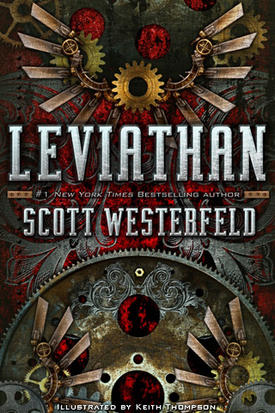Leviathan
by Scott Westerfeld
"Maybe this was how you stayed sane in wartime: a handful of noble deeds amid the chaos. "
I had fallen off the YA bandwagon for a while, and felt the genre was too simple for my taste. Leviathan has changed all of that!
The world is quivering on the brink of WWI. However, it is WWI with a Steampunk twist. The "Clanker" nations (read "Axis powers") have developed not tanks but walking war machines. They rely on metal and steam for their incredibly complex technology. The "Darwinist" countries, the allies (mostly England), have gone the opposite route. Darwin not only discovered natural selection, but DNA and how to manipulate it. British technology is entirely biological, using genetically modified animals, and built-in ecosystems to make their nation run. For example, their zeppelin-like Leviathan is actually a large sky whale with a hollow interior that produces its own hydrogen with the help of the bees and birds who give it its needed fuel every day. Hydrogen sniffers (dog/ spiders) run along its skin to make sure no leaks have sprung.
Enter our protagonists: Alex, a prince of Austria, who dreams of battle, and finds himself dragged out of bed one night, his parents murdered, and forced to run for a safe haven in the Swiss Alps. Deryn, a girl pretending to be a boy to join the British Air Service, finds herself on an important mission to escort a female scientist and her secret cargo to an unknown location. Of course, their story lines crash together and they must work together to survive.
This book was incredibly well-written. The world building alone is admirable and wonderfully creative. The world of the Clankers is easy to imagine, but the world of the Darwinists takes a bit of a stretch. Some might balk at the idea of genetic modification, but Alex and Deryn constantly argue which lifestyle is better, and you get to see both sides. The book also contains intricate illustrations, as even the best descriptions in the book do not fully capture the complexity of creatures like Huxleys (hot air balloon jellyfish creations).
The two main characters are also highly developed and have a clear journey throughout the book. Alex starts as a spoiled brat, but is forced into situations that make him mature with surprising strength and fiber. I was immensely impressed with how Westerfeld treated the character of Deryn. She has small moments where her disguise is mentioned and she has to struggle to hide her girlhood. However, most of the time he treats her as a human being, not a fish out of water. She is gutsy, brash, wry and impertinent. She is a skillful flyer from the get-go, and only improves. As to the inevitable romance looming in every YA book, it isn't mentioned until the end of the book, and even as a mere blip on the radar.
The one...flaw? I found was that it read as the first half of a book. It is the first of two books, but it felt cliffhanger-y, like the first part of a Doctor Who two-part episode. It has a small resolution, but I would have rather had one big book than two small ones. It was certainly not a large enough to put me off the book!
If you liked this book, you may like:

No comments:
Post a Comment